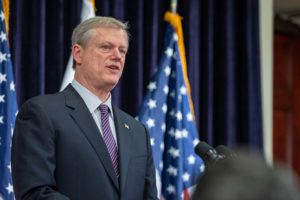Who is a member?
Our members are the local governments of Massachusetts and their elected and appointed leadership.

Gov. Charlie Baker announces additional measures to address a recent rise in COVID-19 cases and to ensure acute care hospitals have sufficient capacity to care for COVID and non-COVID patients at a State House press conference on Dec. 21. (Photo courtesy Joshua Qualls/Governor’s Press Office)
Gov. Charlie Baker this morning announced additional measures to address a recent rise in COVID-19 cases and to ensure acute care hospitals have sufficient capacity to care for both COVID and non-COVID patients.
These measures include deployment of National Guard troops to support the health care system and an updated mask advisory, which recommends, but does not require, that all individuals, regardless of vaccination status, wear a mask or face covering in indoor, public spaces.
The Department of Public Health particularly urges this recommendation for individuals who have a weakened immune system, or are at increased risk for severe disease because of age or an underlying medical condition, or if someone in their household has a weakened immune system, is at increased risk for severe disease, or is unvaccinated.
All people in Massachusetts (regardless of vaccination status) are required to continue wearing face coverings in certain settings, including transportation and health care facilities. These rules have not changed since May 29.
The governor said the Commonwealth’s nation-leading vaccination rate, widely available testing, and solid understanding of COVID and effective precautions make a mask mandate unnecessary. Along these lines, the administration last week announced an ambitious plan to make free and low-cost test kits available to communities statewide.
Baker was adamant that the state would not tell individual cities and towns what COVID precautions are appropriate for them, and municipalities are welcome to set more stringent rules based on local conditions.
A number of communities — such as Lowell, Chelsea, Boston, Somerville and Salem — have implemented indoor mask mandates, while others are contemplating them. Yesterday, the city of Boston updated its COVID public health policy, effective Jan. 15, to require proof of vaccination in order to enter many indoor public spaces, including dining establishments, convention centers, fitness centers and entertainment venues. Somerville followed suit today, and similar standards are in the works elsewhere.
Baker reminded residents that getting a vaccine and booster remain the best way to protect against serious illness or hospitalization from COVID.
Updated data from the DPH shows that 97% of COVID breakthrough cases in Massachusetts have not resulted in hospitalization or death. Unvaccinated individuals are five times more likely to contract COVID than fully vaccinated individuals and 31 times more likely to contract COVID than individuals who have a booster.
According to the DPH, more than 94% of eligible residents have received at least one dose of a COVID vaccine. More than 89% of the entire Massachusetts population has at least one dose, and 74% of the entire population is fully vaccinated.
Massachusetts also leads the nation in vaccinating communities of color, with 68% of all black residents and 67% of all Hispanic residents receiving at least one dose, compared to 42% of black residents and 51.7% of Hispanic residents nationally.
The governor said the Department of Elementary and Secondary Education’s current mask requirement and Policy on Vaccination Rate Threshold, issued on Sept. 27, are not affected by today’s announcements.
Health system support
Regarding the Commonwealth’s health care system, Baker said a critical staffing shortage has contributed to the loss of approximately 500 medical/surgical and ICU hospital beds since the beginning of the year. Hospitals are also seeing a high level of patients, many due to non-COVID-related reasons.
He said he is activating up to 500 members of the Massachusetts National Guard to address the non-clinical support needs of hospitals and transport systems. Up to 300 of these Guard members will begin training this week and will support 55 acute care hospitals, as well as 12 ambulance service providers across the Commonwealth.
The DPH surveyed all hospitals and ambulance service providers, and, in concert with the Massachusetts Health and Hospital Association, has identified five key roles that non-clinical Guard personnel can serve in support hospital operations for up to 90 days.
These roles include non-emergency transport between facilities, patient observers, security support, in-hospital transport, and food service/tray delivery support.
Guard personnel will be deployed to the field beginning on Dec. 27.
Under updated guidance from the DPH, effective on Dec. 27, all hospitals are directed to postpone or cancel all nonessential elective procedures likely to result in inpatient admission in order to maintain and increase inpatient capacity.